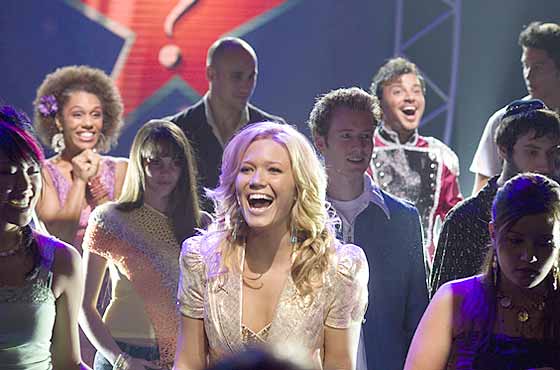
Paul Weitz’s politics-showbiz parody, American Dreamz, suggests that the biggest problem facing satirists today is that they can’t begin to compete with what’s happening in Washington, Iraq, Afghanistan, New Orleans, or even the sleazy corridors of network TV. Consider the reality: the fourth amendment in tatters; carnage in Iraq; a potential U.S. nuclear strike on Iran; Simon Cowell as an arbiter of taste. It’s so much wilder than it is in Dr. Strangelove or Wag the Dog, let alone in this spottily funny clown-show, which is dwarfed in its insights (and its laughs) by even a bad day on The Daily Show.
The movie does begin with a good, farcical premise: To win back the public, George W. Bush (or his alter ego, Staton, played by Dennis Quaid) signs up as a guest judge on the finals of American Idol (or its stand-in, American Dreamz), which is presided over by a smarmy (and cruel) ringmaster, Tweed (Hugh Grant). But Weitz’s naïveté comes out in how the president gets to the program. The morning after Staton’s slim reelection, he decides (for no particular reason) to read a newspaper. Although he’s a dimwit, his eyes are opened by the complexity of issues his administration has hitherto painted as black and white, and he holes himself up in his White House bedroom with more newspapers (even Canadian ones!), magazines, and scholarly tomes. To the horror of his Rovian handler (Willem Dafoe with a chrome dome), he realizes that he’s out of touch.
Now, no matter what you think of our president, his ignorance is willed, his messianism is unshakable, and he has never questioned his fitness for his job. American Dreamz is reminiscent of Charlie Varon’s hilarious but pie-eyed one-man show Rush Limbaugh in Night School, which posits the theory that if Rush were just exposed to, you know, real working-class immigrants in all their tremulous humanity he’d become a born-again liberal. How touching the way some lefties (especially showbiz lefties) cling to the idea that self-interest is but a fragile thing. Of course, liberal epiphanies do provide them with stirring climaxes, as their heroes put themselves on the line for their newfound ideals.
That happens here, but at least there are good bits along the way. I hooted at Tweed’s insults (delivered by Grant with acid aplomb) and at the parodies of American Idol singers, with their overscaled finishes and cornball Vegas air-sculpting—although, once again, how can you top the original? Weitz is no stumblebum. For all the critical derision, his American Pie (co-directed with his brother, Chris) was a riotous depiction of adolescent-male sexual anxiety, and the brothers’ adaptation of Nick Hornby’s About a Boy was an elegant piece of storytelling. It’s too bad that, without his brother, Weitz has too few colors on his palette. Most of his jokes hinge on camp incongruity, like the Iraqi terrorist-in-training Omer (Sam Golzari) who in his tent on the Pakistan-Afghanistan border capers to Broadway show tunes.
Omer’s fellow fundamentalist soldiers ship him off to America to be a one-man sleeper cell they never intend to wake up, but when he wins a (novelty) spot on American Dreamz, they direct him to blow himself up in proximity to the president. It saps the movie’s energy when Omer has pangs of conscience. But then, everyone else has pangs, too, including Omer’s fiercely ambitious chief competitor, Sally Kendoo (Mandy Moore—who has a lovely, flexible voice and seems altogether too seasoned to be a plausible contestant). To keep his satirist’s street cred, Weitz chases the sentimentality with sour slaps at the audience. But for all its supposed outrageousness, American Dreamz has a soft center. Its shallow cynicism combined with its faith that everything will turn out okay can even be said to breed complacency—the opposite of what satire needs to do in these increasingly dark days.
Little turns out well in Rebecca Dreyfus’s Stolen, a haunting and expansive documentary about the search for the precious paintings stolen in 1990 from Boston’s Isabella Stewart Gardner museum. Dreyfus keeps returning to Vermeer’s The Concert, and in between detective scenes and rather longish exchanges between Mrs. Gardner (read by Blythe Danner) and art critic Bernard Berenson (read by Campbell Scott), she interviews highly emotional Vermeer experts, who describe how the artist captures a fleeting moment so exquisitely that The Concert transcends time. It does not, however, transcend greed: The art thieves we see look like boorish, macho businessmen—indelibly ugly.
At the center of Stolen is a man whose ugliness is only skin-deep: the steadfast art investigator Harold Smith, whose face has been eaten away (literally) by a virulent skin cancer. What an object for a film about the loss of great art. With his Magritte bowler, eye patch, and false nose, he cries out to be painted by a master.
American Dreamz
Directed
by Paul Weitz.
Universal. PG-13.
Stolen
Directed by
Rebecca Dreyfus.
Persistence
of Vision Films.
Not Rated.
E-mail: filmcritic@newyorkmag.com .
